|
|
|
Sort Order |
|
|
|
Items / Page
|
|
|
|
|
|
|
| Srl | Item |
| 1 |
ID:
088414
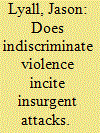

|
|
|
|
|
| Publication |
2009.
|
| Summary/Abstract |
Does a state's use of indiscriminate violence incite insurgent attacks? To date, most existing theories and empirical studies have concluded that such violence is highly counterproductive because it creates new grievances while forcing victims to seek security, if not safety, in rebel arms. This proposition is tested using Russian artillery fire in Chechnya (2000 to 2005) to estimate indiscriminate violence's effect on subsequent patterns of insurgent attacks across matched pairs of similar shelled and nonshelled villages. The findings are counterintuitive. Shelled villages experience a 24 percent reduction in posttreatment mean insurgent attacks relative to control villages. In addition, commonly cited "triggers" for insurgent retaliation, including the lethality and destructiveness of indiscriminate violence, are either negatively correlated with insurgent attacks or statistically insignificant.
|
|
|
|
|
|
|
|
|
|
|
|
|
|
|
|
| 2 |
ID:
152229
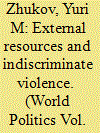

|
|
|
|
|
| Summary/Abstract |
Within a single conflict, the scale of government violence against civilians can vary greatly—from mass atrocities in one village to eerie restraint in the next. This article argues that the scale of anticivilian violence depends on a combatant's relative dependence on local and external sources of support. External resources make combatants less dependent on the local population, yet create perverse incentives for how the population is to be treated. Efforts by the opposition to interdict the government's external resources can reverse this effect, making the government more dependent on the local population. The article tests this relationship with disaggregated archival data on German-occupied Belarus during World War II. It finds that Soviet partisan attacks against German personnel provoked reprisals against civilians but that attacks against railroads had the opposite effect. Where partisans focused on disrupting German supply lines rather than killing Germans, occupying forces conducted fewer reprisals, burned fewer houses, and killed fewer people.
|
|
|
|
|
|
|
|
|
|
|
|
|
|
|
|
| 3 |
ID:
175816
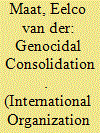

|
|
|
|
|
| Summary/Abstract |
Under conditions of guerrilla conflict, mass indiscriminate violence has been shown to effectively starve a guerrilla of its support. Consequently, counter-guerrilla mass violence is concentrated within territories where a guerrilla is dominant. However, in roughly 40 percent of mass violence episodes (e.g., Rwanda and Cambodia), the violence was aimed at populations within areas of secure territorial control. These episodes have therefore been explained by attributing ideological preferences to leaders or as unique cases only. I argue that leaders adopt mass indiscriminate violence against outgroups to consolidate power under conditions of elite rivalry. The violence serves two main goals. First, it helps build coalitions with constituencies that gain from violence; and second, it targets rival factions indirectly by forcing local security officials to facilitate or oppose the violence. The violence thereby provides rival supporters with an exit option, provides the regime with information on rival supporters’ private loyalties, and undermines rivals’ abilities to mount an effective resistance. These rivals can ultimately be purged from the regime. Based on newly collected original data on elite purges and on the type of mass indiscriminate violence for the years 1950 to 2004, I show that this type of mass violence, which I call “genocidal consolidation,” is intimately connected to authoritarian consolidation.
|
|
|
|
|
|
|
|
|
|
|
|
|
|
|
|
| 4 |
ID:
167281
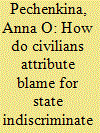

|
|
|
|
|
| Summary/Abstract |
State indiscriminate violence against civilians has been viewed as counterproductive for the government. This conclusion hinges on the assumption that indiscriminate violence aggrieves civilians against the government even when the rebels provoke the state by using civilians as human shields. An alternative view suggests that civilians recognize if the rebels exploit them as human shields and blame the rebels if such provocation occurs. We ask: do civilians evaluate all state indiscriminate violence in the same way or do they think of state indiscriminate violence differently when it is provoked by insurgents? Accounting for the covariate differences between individuals with and without personal experience of warfare in the survey data from postwar Ukraine, we find that personal exposure to violence shapes one’s blame attribution for provoked state attacks on civilians. Individuals unexposed to violence tend to take into account whether the government was provoked by the rebels. By contrast, individuals with personal experience of warfare tend to blame the government for indiscriminate attacks regardless of rebel provocation. This finding has implications for counterinsurgency scholarship and policy. It is likely that the difference between unexposed and exposed to violence civilians emerges in geographically isolated conflicts. If so, targeting of civilians may have different effects on the escalation of insurgency in geographically concentrated as opposed to widespread cases of violence.
|
|
|
|
|
|
|
|
|
|
|
|
|
|
|
|
| 5 |
ID:
105891
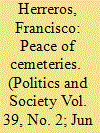

|
|
|
|
|
| Publication |
2011.
|
| Summary/Abstract |
This article analyzes whether state repression in post-civil war situations can be explained by dynamics associated with previous civil wars. It claims that in post-civil war situations the state can more easily resort to indiscriminate repression against social groups, relying on information related to the civil war. Two civil war dynamics are tested: preemptive indiscriminate violence to eliminate opposition by the defeated population and retaliation for crimes committed during the war. Using data from the first decade of the Francoist regime in Spain, the author found that civil war dynamics, and not actual dissent, explain most of the country's postwar violence.
|
|
|
|
|
|
|
|
|
|
|
|
|
|
|
|
| 6 |
ID:
149519
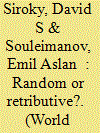

|
|
|
|
|
| Summary/Abstract |
This article provides a critical examination of the current theoretical debate concerning the effects of indiscriminate violence. It argues that indiscriminate violence has been treated as an essentially random counterinsurgency tactic, but that the important distinction between its random and retributive variations has been overlooked, along with critical issues of timing and location, which has made it difficult to evaluate its efficacy in quelling rebel violence. Prior research has shown that both random and retributive violence reduced insurgent activity in the targeted locations and in the short term, but it does not necessarily follow that indiscriminate violence is effective. This article uses microlevel ethnographic evidence from Chechen villages during the period from 2001 to 2005 to show that indiscriminate violence deployed retributively against village communities generated insurgent activity in other areas because local avengers and rebels from the targeted populations sought to avoid further retributive violence against their village communities. Moreover, the insurgent activity occurred at least nine months after the initial act of retributive violence. Indiscriminate violence deployed randomly against village communities generated insurgent activity within the same targeted area, since the insurgents did not fear retributive violence in retaliation, and occurred with a delay of at least six months. As a result, the rebel reaction to indiscriminate violence is not observed immediately or, in the case of retributive violence, in the same location. This finding has crucial implications for evaluating the efficacy of indiscriminate violence in counterinsurgency operations, and underscores the importance of understanding how the social and political context can shape the way populations react to different forms of violence.
|
|
|
|
|
|
|
|
|
|
|
|
|
|
|
|
|
|
|
|
|